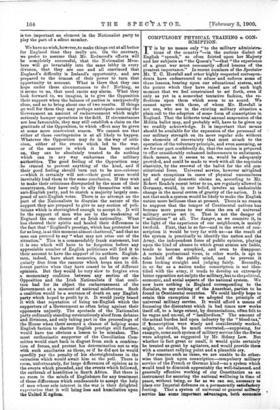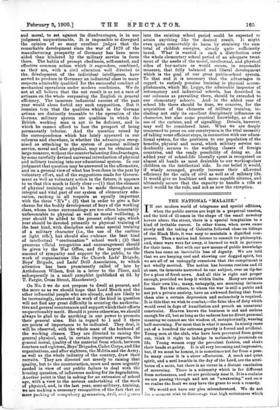COMPULSORY PHYSICAL TRAINING v. CON- SCRIPTION.
IT is by no means only "to the military administra- tions of the country "—in the curious dialect of English " speech," so often foisted upon her Majesty and her subjects as " the Queen's "—that "the experience of a great war must necessarily afford lessons of. the greatest importance." In recent numbers of the Spectator Mr. T. C. Horsfall and other highly respected correspon- dents have endeavoured to educe and enforce some of these lessons, bearing upon our educational system, and the points which they have raised are of such high moment that we feel constrained to set forth, even if only as yet in a somewhat tentative fashion, the re- flections upon them which seem to us sound. We cannot agree with those, of whom Mr. Horsfall is not one, who see in the existing military situation a plain call to the adoption of some form of conscription in England. That the hitherto total annual suspension of the Militia ballot may, and probably will, have to be given up we readily acknowledge. It is important that means should be available for the expansion of the personnel of our military strength on its more regular side without the elements of uncertainty that must attach to the operation of the voluntary principle, and even assuming, as we for our part confidently do, that the nation is prepared to offer considerably enhanced inducements to enlistment. Such means, as it seems to us, would be adequately provided, and could be made to work with all the requisite elasticity, by the renewal of the ballot for the old con- stitutional force. Universal service, however mitig'ated by such exceptions in cases of physical unsoundness and of special domestic claims as, according to Mr. Robert Reade's recent letter to us, are regularly allowed in Germany, would, in our belief, involve an undesirable change in the moral centre of gravity of the nation. It is not that such a system would be likely to make the English nation more bellicose than at present. There is no reason to suppose that the temper of Continental nations has become more prone to war since the era of universal military service set in. That is not the danger of " militarism" at all. The danger, as we conceive it, in the light of the experience of our neighbours, is mainly twofold. First, that in so far—and in the event of con- scription it would be very far with us—as the result of the system is practically to identify the nation and the Army, the independent force of public opinion, playing upon the kind of abuses to which great armies are liable, tends to become atrophied, and even to disappear. A certain professional virus, in other words, is apt to take hold of the public mind, and to prevent it from looking straight and judging fairly. Secondly, in so far as a, nation under conscription is not iden- tified with the army, it tends to develop an extremely bitter opposition not onlyito the military, but to the political, economic, and social aspects of the national system. We now have nothing in England corresponding to the Socialist, to say nothing of the Anarchist, parties to be found in Oontinental countries. We could hardly hope to retain this exemption if we adopted the principle of universal military service. It would afford a means of focussing the discontent which in bad times now works itself off, to a large extent, by denunciations, often felt to be vague and unseal, of " landlordism." The amount of the actual burden laid upon industry by the " blood-tax," if $onscription were wisely and considerately worked, might, no doubt, be much overrated,—supposing, for example, some such system of military service like the Swiss were adopted, as suggested by Mr. Sidney Low. But whether in fact great or small, it would quite certainly be treated as great by agitators, and would provide them with a constant rallying point and a plausible cry.
For reasons such as these, we are unable to do other. wise than took upon conscription—compulsory military service of the French or German kind—as a system which would tend to diminish appreciably the well-balaneed..and generally effective working of our Constitution as an instrument for securing the national wellbeing in time of peace, without being, so far as we can see, necessary to place our Imperial defences on a permanently satisfactory footing. That a system of universal or general miitts,r7 service has some Important advantages, both economy; and moral, to set against its disadvantages, is in our judgment unquestionable. It is impossible to disregard the opinion of so many excellent judges that the remarkable development since the war of 1870 of the manufacturing prosperity of Germany has been more aided than hindered by the military service in force there. The habits of prompt obedience, self-control, and effective common action which it engenders, combined, as they are, with a civil education well directed to the development of the individual intelligence, have served to produce in Germany an industrial class in many respects admirably qualified for the successful conduct of mechanical operations under modern conditions. We do not at all believe that the net result is as yet a race of artisans on the whole surpassing the English in general efficiency. The immense industrial success of the past year would alone forbid any such supposition. But it remains true that the qualities which in the German artisan are distinctly traceable to the operation of the German military system are qualities in which the British working man is apt to be deficient, and in which he cannot afford to face the prospect of being permanently inferior. And the question raised by the correspondence which has lately appeared in our columns and elsewhere, is whether the advantages recog- nised as attaching to the system of general military service, moral and also physical, may not be obtained in large measure, without the counterbalancing disadvantages, by some carefully devised universal introduction of physical and military training into our educational system. In our judgment that question may be answered in the affirmative, and on a general view of what has been done in the past by voluntary effort, and of the suggestions made for Govern- ment as well as voluntary action in the future, it appears to us that this much is fairly clear :—(1) that the element of physical training ought to be made throughout an integral and vital part of our system of elementary edu- cation, ranking in all respects as equally important with the three " R's" ; (2) that in order to give a fair chance for the bodily development of boys of the working class, whose home surroundings are too often lamentably unfavourable to physical as well as moral wellbeing, a year should be added to the present school age, which year should be devoted primarily to physical training of the best kind, with discipline and some special training of a military character (i.e., the use of the carbine or light rifle), but should also embrace the best kind of intellectual " continuation " school work ; (3) that generous official recognition and encouragement should be given by the War Office, and the largest possible amount of sympathy and support by the public, to the work of organisations like the Church Lads' Brigade, Boys' Brigade, and Lads' Drill Association, to which attention has been prominently called of late by Archdeacon Wilson, first in a letter to the Times, and subsequently in a small pamphlet (published at 6d. by T. Fergie; Cross Street, Manchester).
On No. 3 we do not propose to dwell at present, and the more so as we should hope that Lord Meath and the other influential people who are already, and are likely to be increasingly, interested in work of the kind in question will not find any great difficulty in securing the authorita- tive and general countenance and support which their efforts unquestionably merit. Should it prove otherwise, we should always be glad to do anything in our power to promote their general aims. But in regard to 1 and 2 there are points of importance to be indicated. They deal, it will be observed, with the whole mass of the boyhood of the working classes. They are directed to raising the general physical, and, in certain important respects, the general moral, quality of the material from which, between fourteen and eighteen, Boys' Brigades, Cadet Corps, and like organisations, and after eighteen, the Militia and the Army, as well as the whole industry of the country, draw their recruits. They are directed not merely to raising that quality, but to the counteraction, more and more urgently needed in view of our public failure to deal with the housing question, of influences making for its degradation. Another point is that in asking for an extension of school age, with a view to the serious undertaking of the work of physical, and, in the last year, semi-military, training, we are making a necessary recognition of the fact that no mere packing of compultory gymnastics, drill, and gtutes into the existing school period could be expected tc attain anything like the desired result. It might even quite conceivably do harm by straining the sum total of childish energies, already quite sufficiently taxed. What is wanted is such a distribution over the whole elementary school period of an adequate treat- ment of the needs of the moral, intellectual, and physical sides of boy-nature as would secure, in reasonable measure, that fully balanced and liberal development which is the goal of our great public-school system. To that end it is necessary that the advantages in regard to entirely genuine training in physical accom- plishments, which Mr. Legge, the admirable inspector of reformatory and industrial schools, has described in our columns as prevailing there, should be extended to our elementary schools. And in the added year of school life there should be time, we conceive, for the acquisition of the elements of military training, in- cluding not only its excellent disciplinary influences on character, but also some practical knowledge, as of the use of the carbine, and of signalling. Details, however, may well be considered later. What we are deeply concerned to press on our countrymen is the vital necessity of taking some efficient steps, in connection with our educa- tional system, for the provision to our population of the benefits, physical and moral, which military service un- doubtedly secures to the working classes of foreign countries, and the ready possibility of doing so. An added year of school-life liberally spent is recognised on almost all hands as most desirable to our working-class children on the intellectual side. In our belief it would,' if wisely arranged, greatly increase their all-round efficiency for the calls of civil as well as of military life. It would give us healthier and more capable citizens, and ultimately secure that the capacity to handle a rifle at need would be the rule, and not as now the exception.







































 Previous page
Previous page